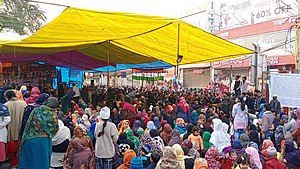

By Sunil Garodia
First publised on 2020-10-07 19:06:01
Protesting peacefully against any issue, be it government policy, any incident or a grievance against any public service, is a democratic right. But that right has to be balanced in such a way that the right of the protestors does not infringe on the democratic right of freedom of movement and even right to life of people who have not joined the protests.
The Supreme Court has categorically said that "occupation of public places or roads by demonstrators, which cause inconvenience to a large number of people and violate their rights, is not permissible under law." A bench of Justices Sanjay Kishan Kaul, Aniruddha Bose and Krishna Murari was hearing several petitions seeking guidelines on the right to protest in the wake of the Shaheen Bagh protests against the CAA and NRC in the capital which blocked an important thoroughfare for over three months when it ruled on the matter.
The court was of the opinion that no person or group of persons can block public places or thoroughfares indefinitely (which must be construed to mean beyond a reasonable and limited time) to demonstrate or express dissent. It added that such protest demonstrations should normally take place at designated places where inconvenience to the general public would be negligible. It said that the administration must never allow such protests at public places. It also said that the authorities should clear public places if protests are held there without waiting for court orders as they will be deemed to be illegal.
After this order of the apex court, it is important that all local bodies, in association with the local police, earmark designated places for holding protests. All protestors assembling at any other place should be immediately dispersed. The apex court has provided the necessary backing to the local administrations and they should not dither any more. The size, affiliation or composition of the crowd should not come in the way if they are bent on blocking public places. There should be zero tolerance policy for allowing protests that cause inconvenience to the general public.











